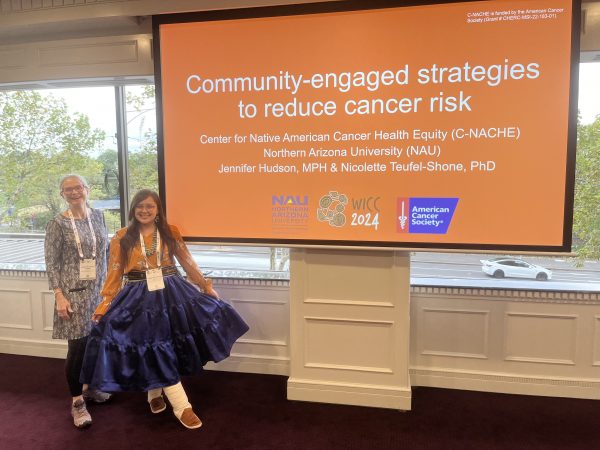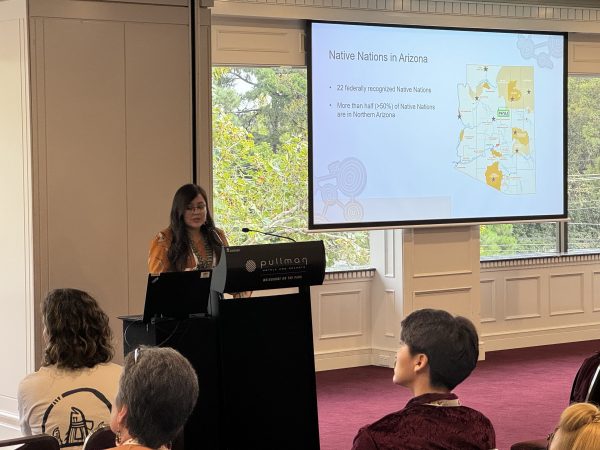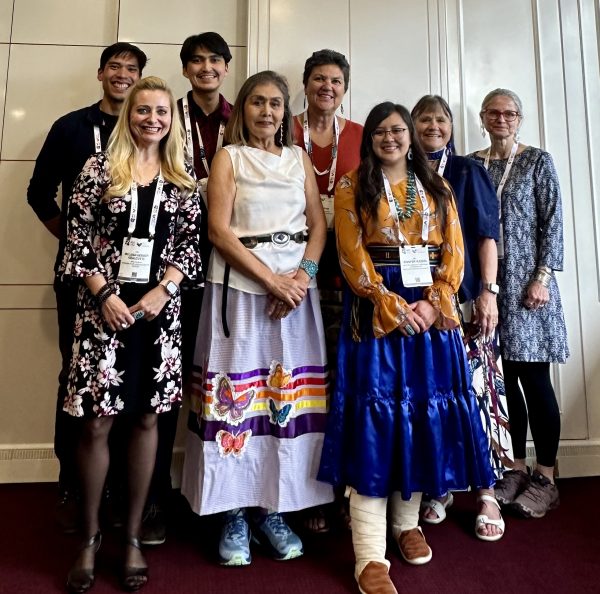Introduction
The Center for Native American Cancer Health Equity (C-NACHE) team attended a global Indigenous health conference focused on addressing cancer health equity through collaboration across borders. Cultural integration in healthcare and community-driven health strategies were clear drivers in the progress of minimizing disparities in cancer care, along with addressing every phase of the cancer continuum with a focus on Indigenous methodologies, from early detection to end-of-life care.
The conference, which encompassed topics aligning with the theme of “Process. Progress. Power.” encouraged network building to share insights and foster support across geographic and cultural boundaries. The combined knowledge and experience from this event have sparked ideas for transformative change when it comes to Native American cancer care in the state and nationally.
 Dr. Nicolette Teufel-Shone and Jennifer Hudson posing in front of their presentation title screen.
Dr. Nicolette Teufel-Shone and Jennifer Hudson posing in front of their presentation title screen.
Process
The World Indigenous Cancer Conference (WICC) 2024 took place in Naarm (Melbourne), Australia on March 18– 20. WICC 2024 presented an outstanding opportunity to bring key Indigenous cancer researchers, clinicians, advocates, and community together. The conference identified international research priorities, fostered new collaboration, enhanced capacity and shared knowledge and information about Indigenous people living with cancer on a global scale. Attendees heard from speakers addressing both challenges and progress across the cancer continuum, from prevention and screening to survivorship and palliative care.
Two members of the C-NACHE team attended the conference; C-NACHE Director, Dr. Nicolette Teufel-Shone and Senior Community Program Coordinator, Jennifer Hudson. Hudson presented on behalf of the C-NACHE team, showcasing the Center’s community-engaged strategies to reduce cancer risk for Native American tribes in Arizona. The presentation specifically highlighted the community advisory board (CAB), the annual Arizona Intertribal Cancer Health Equity Forum (AICHEF), and the multi-modal media efforts the Center has implemented.

Hudson, at the podium presenting to the audience.
Progress
At the conference, C-NACHE team members were able to hear and learn from diverse Indigenous communities from the United States, Canada, New Zealand, and Australia, regarding their respective cancer challenges and initiatives, which helped broaden the C-NACHE team’s perspective on strategies they could implement themselves.
A prominent pattern they noticed amongst the other countries was the utilization and appreciation of community and culture throughout their efforts. This was noticed even before arrival to the conference, as Hudson noted
“Even when my plane landed in Australia, the flight crew performed a land acknowledgement and let us know who the original custodians of the land are.”
This acknowledgement, appreciation, and respect of Indigenous communities seemed like the societal norm of Australia. Hudson went on to say
“It was a surreal experience, especially coming from the States, where Indigenous peoples are not given the same recognition and where some Americans still forget our people exist. In a way, it was bittersweet, because on one hand I was upset with the realization of this comparison but on the other hand, I was excited to see the possibility of what could be achieved when Indigenous communities and voices are acknowledged and amplified in the larger societal context.”
Throughout the conference itself, the collective community energy was evident, from the conference logistics to the presentation styles. One thing that stood out was the Māori songs the Indigenous groups of New Zealand would sing before and after their presentations. Hudson stated
“It would set the stage and intentions of each of their presentations, and it was incredible to see and hear. One person would start and slowly everyone who knew the song would join in to form this strong collective voice. I think that created a lot of good energy in the room and made it all the more welcoming.”
This welcoming environment went on to foster connections among conference attendees. Because key Indigenous cancer researchers, clinicians, advocates, and community members attended this conference, it presented an incredible opportunity to network with others – from the United States and globally. Hudson mentioned that due to the conference being hosted outside the U.S., the preconceived walls between U.S. groups were broken down and the connection between one another was strengthened.
One influential connection Hudson made was with a fellow Indigenous woman from New Mexico, Hudson’s home state, who works for Cancer Services of New Mexico. They discussed the New Mexico State Cancer Plan and the document that was developed to help implement the New Mexico Cancer Plan in Native American communities. C-NACHE has identified a similar need for the state of Arizona, which would acknowledge the inherent cultural assets that differentiate each tribal community when it comes to cancer prevention, control, and treatment. Hudson said,
“It’s remarkable that it required traveling across the world for two women from the same home state to convene and discuss such a significant effort and opportunity.”
In addition to these connections, new networks were made with individuals out of the country, with names and organizations previously only heard of in articles. Through the program booths at the conference, Dr. Teufel-Shone connected with various practitioners and coordinators. She went on to state that
“Through their example, I realized ways we could incorporate the arts more purposefully in our work. In C-NACHE and NACP, we tend to think about artwork to enhance the visuals of our fliers or websites. But at the WICC, Indigenous cancer programs used art in the creation of scarfs for those experiencing hair loss during treatment or shawls for respecting women’s modesty while getting a mammography. Their work inspired me to think outside of the box. Even Jennifer’s observation of the Māori singing; how can we use music or the visual arts to support the feeling of a coalition working to make a change in health outcomes of Indigenous people.”
Clearly, C-NACHE team members were able to make worthwhile connections and memories at WICC 2024, with the hopes of continuing to foster those connections going forward.

From left to right: Dr. Jonathan Credo, Dr. Melissa Herbst-Kralovetz, Marquis Yazzie, Mae-Gilene Begay, Dr. Jani Ingram, Jennifer Hudson, Dr. Linda Burhansstipanov, and Dr. Nicolette Teufel-Shone.
Power
WICC 2024 strongly addressed power imbalances and emphasized the role of self-determination in providing Indigenous and Tribal Peoples with voice and support in cancer care and control. One standout revelation was the absence of a National Cancer plan for native communities in the US, highlighting the importance of initiatives like C-NACHE. The C-NACHE team looked to other organizations for inspiration on this and learned of various strategies that have effectively engaged Indigenous communities and led to the development of vital cancer plans. In small circles, they discussed how to involve C-NACHE more actively in such endeavors, bridging gaps and fostering collaboration on an international level. Dr. Teufel-Shone stated.
“Although I attended the WICC several years ago in Canada, my attendance this year reinforced my realization that unlike Canada, New Zealand and Australia, the US does not support a national initiative to address cancer prevention and treatment in Indigenous people. The lack of funding in the US to improve access to cancer screening and treatment is a travesty and a national injustice. I shared this realization with our Community Advisory Board (CAB) so together we can develop ways to inform national leaders to act and address this disparity to make a difference in cancer outcomes for Indigenous people.”
Members of the C-NACHE team have started engaging with the Arizona Cancer Coalition Policy Workgroup to see how the Native voice can be implemented in the upcoming Arizona State 5-Year Cancer Plan.
Looking ahead
As for the next WICC, Teufel-Shone said, “The location and year of the next WICC was not announced. C-NACHE will absolutely be represented. After a couple more years working with our CAB, I know we will be describing the ways we informed policy and made a difference for Indigenous people in Arizona and hopefully, on a national level.”
